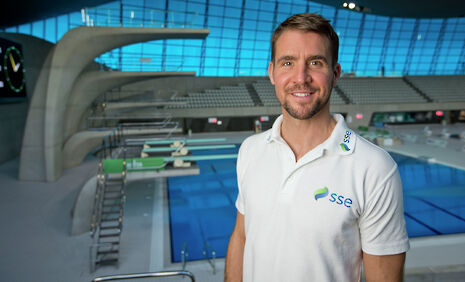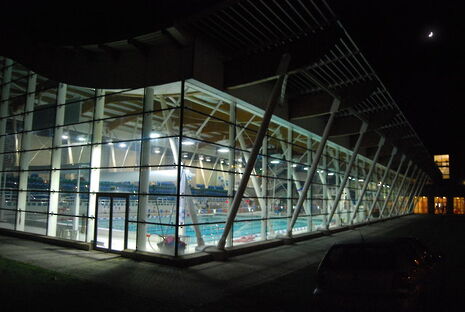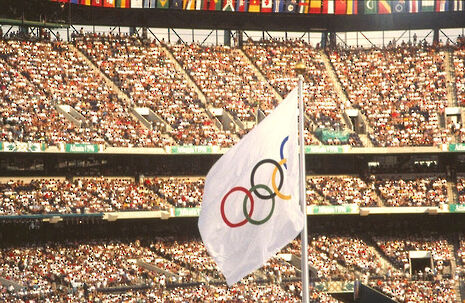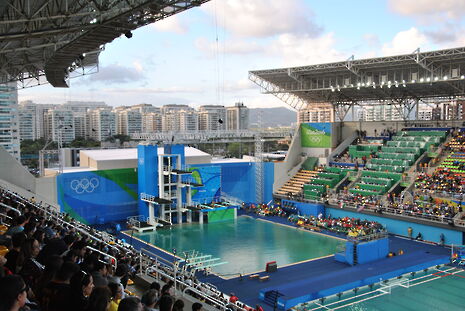Leon Taylor: ‘If anyone wants to push boundaries, diving is the greatest sport for it’
Keir Baker talks mentors, medals and mental strength with the BBC’s expert diving commentator and Olympic silver medallist.

It is hard to describe Leon Taylor as anything but ‘Mr Diving’. Having begun the sport aged just eight, he went on to claim Team GB's first Olympic diving medal in 44 years at the 2004 Athens Olympics with a silver in the men's synchronised 10-metre platform. He secured further honours at the World Championships and the Commonwealth Games, and managed to find the time to invent the ‘World's Hardest Dive’. Following his retirement in 2008, he mentored wonder-kid Tom Daley, became the voice of the BBC's diving coverage and squeezed in judging ITV’s diving reality show Splash! for good measure.
Yet it could have all turned out so differently: aged 11, Taylor was ranked 16th in the country for swimming and fourth for gymnastics, as well as first for diving. “But I gravitated towards diving in the end,” he explains. “It was the combination of the thrill of the sport and the level I was able to achieve that swayed me – when you’re that age, you absolutely love the feeling of winning”.
"Diving always had something extra for me. If anyone wants to push boundaries, it’s the greatest sport for it. There are so many different types of diving board and types of dive, and that means there'll never be a training session where you aren’t nudging against your comfort zone or nudging against the perceived boundaries of what you can or can’t do. That's such a rewarding activity to take part in.”
There is a sizeable proportion of the UK public who would agree with him: both the demand for greater coverage of, and participation in, the sport has been on the rise. In Cambridge, the sport has been the subject of renewed interest following local boy Dan Goodfellow’s bronze medal at Rio 2016. So what is Taylor’s advice for Cambridge students who have been inspired by Goodfellow – who trained at Parkside Pool next to Parker’s Piece – to have a go at diving, but question their physical capacity for it?

“It’s never too late,” he tells me earnestly. “I hate the phrase ‘natural talent’ because we all have potential. Nobody should dismiss trying diving because they think they’re too inflexible: you can always get more mobile through diligence, tenacity and commitment. Indeed, while those who are naturally less mobile might initially struggle with the complexities, being super bendy isn’t an advantage – you’ll just hit the water and collapse.”
“Divers are fighting against gravity and g-force, so they need to be powerful, explosive and dynamic too. So you end up fine-tuning and conditioning your body by training outside the diving pool, either in the gym or on trampolines and gymnastic equipment.”
However, when pushed, the Cheltenham-born Olympian does admit that if Cambridge students with no acrobatic experience were going to “aim for the Olympics”, they may run into some difficulties. “Certain neurone pathways that are needed for that kind of success must be built early on, ideally through sports like gymnastics, trampolining or diving. They give you an insane level of aerial awareness that allows you to fly through the air.”
“But those who have done those sports at a younger age and have subsequently given them up will still have those pathways somewhere – I'd say they are the Cambridge students who could take up diving and get all the way to the top.”
Taylor explains that there is another mental element to diving that is best nurtured at an early age, noting with a laugh that "up to the age of eight, you’re fearless and don’t talk yourself out of jumping off the board. After all, at the end of the day, a diver has to stand on a high board, on their tiptoes, and acknowledge that in a moment’s time, they’ve got to jump off, spin around and hit the water at speed. You need a lot of mental toughness to even attempt a dive – never mind performing it at a competition.”
Taylor can certainly empathise with Cambridge students who feel their workloads prevent them from taking up a sport like diving. At the start of his career, diving was not a professional sport and there was no National Lottery funding; Taylor was thus forced to balance other aspects of his life with training.

Indeed, he attributes the successes of his own career, and the whole of Team GB’s recent achievements, to the introduction of this financial investment in sport.
“In my first Olympics Games – Atlanta 1996 – Team GB came 36th on the medal table with just one gold,” he recounts. “There was a national outcry about how poor we were at sport, and it was concluded that every country ahead of us had well-funded sports programmes. So the decision was made to bring in UK Sport and the National Lottery funding.”
“And look at what’s happened 20 years later. Sustained funding has worked, not because athletes have been given money so they can pay their rent and put food on the table, but because they are now exposed to higher levels of competition, better coaching, physiotherapy, nutrition and sports psychology.”
And which of these factors has been the key to Team GB's successes in diving?
“Each athlete needs different input in different ways but for me, the biggest difference was the sports psychology. There’s a certain mindset required for high performance, whether that’s in sport, academia, music, art or business. So the psychology gave me vital insights that worked throughout my career, and it’s something that runs deep through everything I do even now – whether it's coaching, mentoring and speaking.”
In addition to speaking engagements and mentoring, Taylor has looked to spread insights gleaned from his sporting career through his 2011 book Mentor. The book discusses the importance of utilising and becoming mentors in all aspects of life, and he believes its overarching message is relevant for Cambridge students.
“The big takeaways are the benefit of finding mentors and the benefits of being a mentor yourself. When I discuss the latter, I'm arguing that if you’ve got all this knowledge and experience that you’ve collected on your journey, the biggest gift you can give to humanity is to share it with others and inspire people. Mentoring is the way that the human race has been learning for centuries.”
Having been part of the BBC’s commentary team over the summer, Taylor offers real insight into the trials and tribulations of this year's Olympic Games. When I raise a number of the myriad of concerns that existed prior to Rio 2016, he is quick to dimiss their importance, noting that “it always happens with the Olympics: before China, it was human rights concerns; before Athens, it was about whether the facilities would be finished, and before London it was the overspending. But, as soon as the sport starts, the world comes together to watch the magic unfold.”
The diving competition at Rio was unlike anything that the Olympics had ever seen. Taylor enjoyed the spectacle of the ‘Green Water Scandal’ – when the diving pool temporarily turned a vibrant shade of green – attributing it to a “schoolboy error”. He explains that outdoor diving “often creates unusual results, with the sun and wind occasionally throwing divers off. But as an athlete, you can only prepare for what you’re going up against – you have to deal with it and get used to different conditions.”
The three-time Olympian also offers interesting thoughts about the gender divide in Team GB’s diving success: while the men secured four medals, the women came home empty-handed. “When you judge it by medals, it looks very different to when you judge it by performance and performance trends,” he explains, choosing his words with care. “Indeed, the trends show that female diving is moving in a positive direction: Grace Reid was our first finalist in her event since 1972. And, given that the coaching staff and the training methods used are identical, in 20 years’ time, it could easily be the other way round.”

One of Taylor’s greatest achievements was the invention of the ‘World’s Hardest Dive’. In 1998, his reverse 2 ½ somersaults with 2 ½ twists in pike – known in shorthand form as 5255b – had the highest difficulty rating of 3.8 until changes in 2009 saw it downgraded to 3.6.
“The opportunity came along after a change in the rules created a new formula which meant that, so long as you fulfilled it, any dive was valid. So I decided that a new dive would make people take notice of me.”
"It was a long process of breaking down the component parts and working on them separately. Starting on the trampoline, we progressed up the different boards and eventually it came to point where I was standing on the edge of a 10-metre board, looking to do something that was previously impossible. I just had to take the leap into the unknown. Nowadays, it no longer has the same status, though: they’re doing much more difficult dives.”
Chuckling when I ask whether he is troubled by this, he points out that "if you look at any field or industry, the proverbial bar is always being raised and I celebrate that progress: you’re deluded if you think the world stops when you quit. My dive is still used because it’s impactful and I can still say I was the first – I’m proud that’ll always be the case.”
To verify that Taylor truly does love the sport and is excited by its continued progression, one need only listen to his commentary. His enthusiasm, his knowledge and his capacity for analogy have made him one of the BBC's most popular commentators:
“I enjoy demystifying the sport I love for millions of people and making it accessible to all. I used to listen to the commentary and say, ‘I reckon I could do that better,’ so during the end of my career, I took the opportunity to find mentors at the BBC and to shadow them – I put in lots of hard work and determination to get a shot and I’m glad I’ve made it count.”
This transition from diver to commentator at the end of his career certainly is inspirational, particularly as his final few years of competing were hampered by injury troubles that he admits finding difficult to take. But Taylor adamantly champions the idea that playing sport can help tackle any mental issue – including the one almost every Cambridge student will experience throughout their degree: stress.
“No matter the sport or physical activity – whether it be diving or something else – get out there and use your body,” he says. “You can never think your way out of stress – it always comes down to moving and being active.”
“Ultimately, you’ve got to have fun. It's as simple as that. We make things too complicated in life. But when it comes down it, the most important thing in life is having fun. As we get older, we take everything too bloody seriously, take on too much responsibility and squeeze the fun out of things.”
Cambridge students interested in trying diving can attend a free taster session with the Cambridge University Diving Team, who train at Parkside Pool, next to Parker's Piece. More information can be found on their website, and any specific questions can be directed to the Team's Captain, Danny Christie (divingclub@cusu.cam.ac.uk).
 News / Uni Scout and Guide Club affirms trans inclusion 12 December 2025
News / Uni Scout and Guide Club affirms trans inclusion 12 December 2025 News / Cambridge Vet School gets lifeline year to stay accredited28 November 2025
News / Cambridge Vet School gets lifeline year to stay accredited28 November 2025 Science / Did your ex trip on King’s Parade? The science behind the ‘ick’12 December 2025
Science / Did your ex trip on King’s Parade? The science behind the ‘ick’12 December 2025 News / Cambridge study finds students learn better with notes than AI13 December 2025
News / Cambridge study finds students learn better with notes than AI13 December 2025 News / Pembroke to convert listed office building into accom9 December 2025
News / Pembroke to convert listed office building into accom9 December 2025








